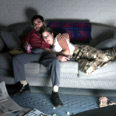
Religious TV viewers not as frightened as secular counterparts
Research carried out by Israelis Amir Hetsroni and Hila Levenstein on TV viewing habits uncovers unique psychological phenomenon – the counter cultivation effect
"The more religious people watch television, the less frightened they are of crime and the more television the secular population watches, the more frightened they become." This surprising finding is part of a study which will be published in the next volume of the prestigious scientific periodical Psychological Reports.
The research was carried out by two lecturers at the School of Communication - Ariel University of Samaria, Professor Amir Hetsroni and Hila Levenstein, a doctorate student at Bar Ilan University.
Since the '70s, researchers have tried and succeeded in proving that prolonged exposure to television over the years creates a slightly distorted view of the world among viewers. This phenomenon is called the Cultivation Effect.
According to the theory, the more time people spend “living” in the television world, the more likely they are to believe social reality portrayed on television. In other words, the more we watch television, the more we try to see the world around us as similar to that which is presented to us on the small screen.
The cultivation theorists have found that there is a significant relationship between TV consumption and fear of becoming a crime victim. Since most of us do not meet the world of crime in our real day to day lives, television becomes the source of all things crime related. Therefore, "heavy" viewers tend to estimate crime rates as they are on the screen rather than what they are in reality.
Moreover, they tend to estimate the possibility of becoming the victim of a crime as much higher than "light" viewers.
Yet what of viewers from various segments of the population? Does the effect apply to everyone in the same way? The Judea and Samaria Regional Research & Development Center sought to answer those questions by initiating research into the subject.
Fear and religion
The basis of the research was to examine whether West Bank residents who live in a tense region, feel more fear after watching television. In order to carry out a well rounded study, both religious and secular people from Haifa and Kiryat Shmuel (areas with the same socio-economic makeup as the West Bank) were chosen to take part in the study.
Funnily enough the study was aborted as there were not enough settlers who had televisions in their homes. Yet the data collected from the 778 residents of northern Israel who watched channels 2 and 10 during prime time viewing hours in 2009 revealed some unexpected information.
It soon became clear that among secular viewers there was a certain connection between television viewing and fear of falling victim to a crime. Whereas a situation called Counter-Cultivation was diagnosed among religious viewers. This means that the more they watched television, the less they feared becoming a victim of a crime.
Professor Hetsroni: "I admit that the research data surprised and shocked me. Because religion has a strong influence on a person and because religious people have a social support network, my initial hypothesis was that television would affect religious people less than secular people, but the research data has exposed a situation in which they are affected – but in a completely inverted fashion.
"This study uncovered a unique phenomenon that has never been discovered in any previous research, and I say that unquestionably. The data is unequivocal.
"It is my belief that when religious people watch television, they look at criminal cases like a person watching the circus, due to the belief that that kind of crime does not occur in their area.
"And so – their fear lessens. In contrast, when secular people watch crime on television, it seems authentic. For them TV series look like an imitation of reality which is why their fear grows slightly."
Levenstein added that: Counter Cultivation is relatively rare. "The Cultivation Effect, though it has raised criticism over the years, has been found to be solid by decades of research.
"Counter-Cultivation as found in the current research is extremely rare and personally, I know of only one study that found a similar phenomenon among children who play violent video games.
"The rarity of the phenomenon points to the fact that the current findings reflect a unique situation.
"Since religion was the central characteristic distinguishing between the two sample groups, it is likely that the attributes of a religious lifestyle – which are significantly different from that (lifestyle) which is presented on Israeli television – would explain the findings."










